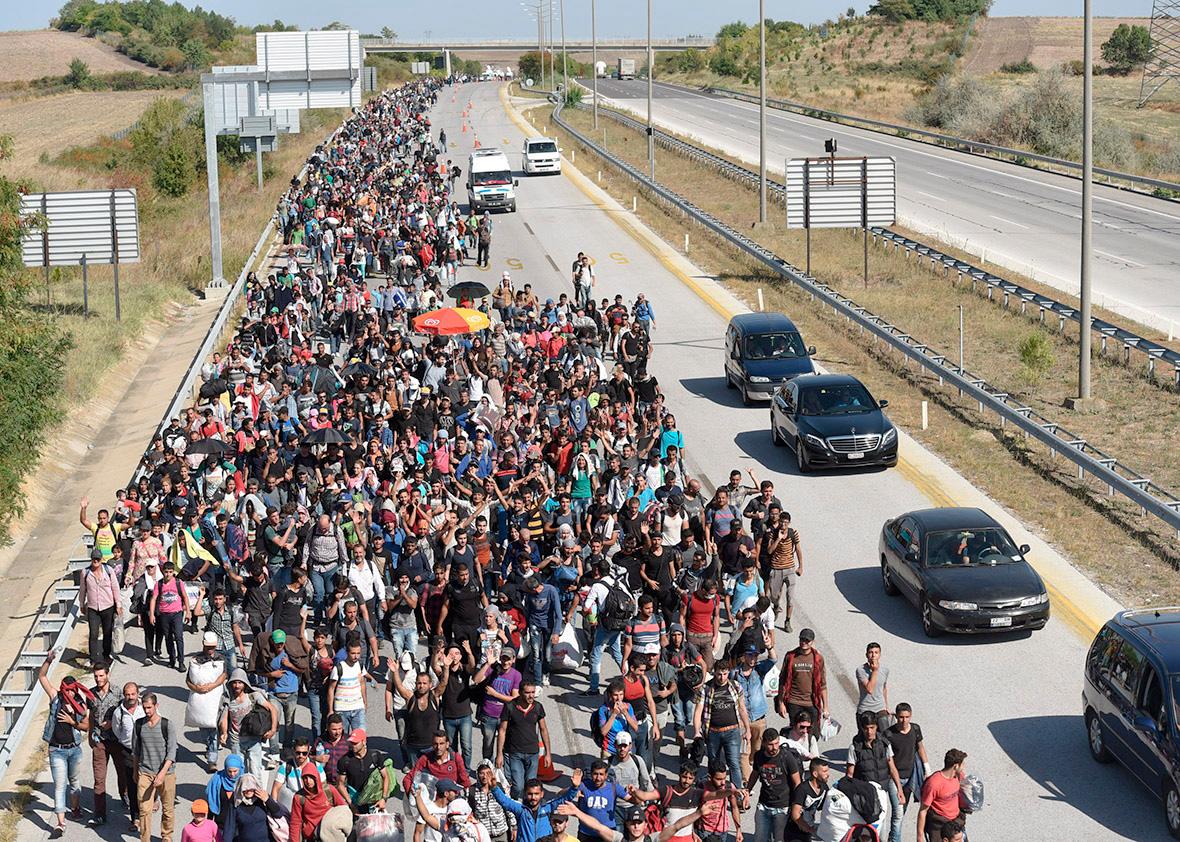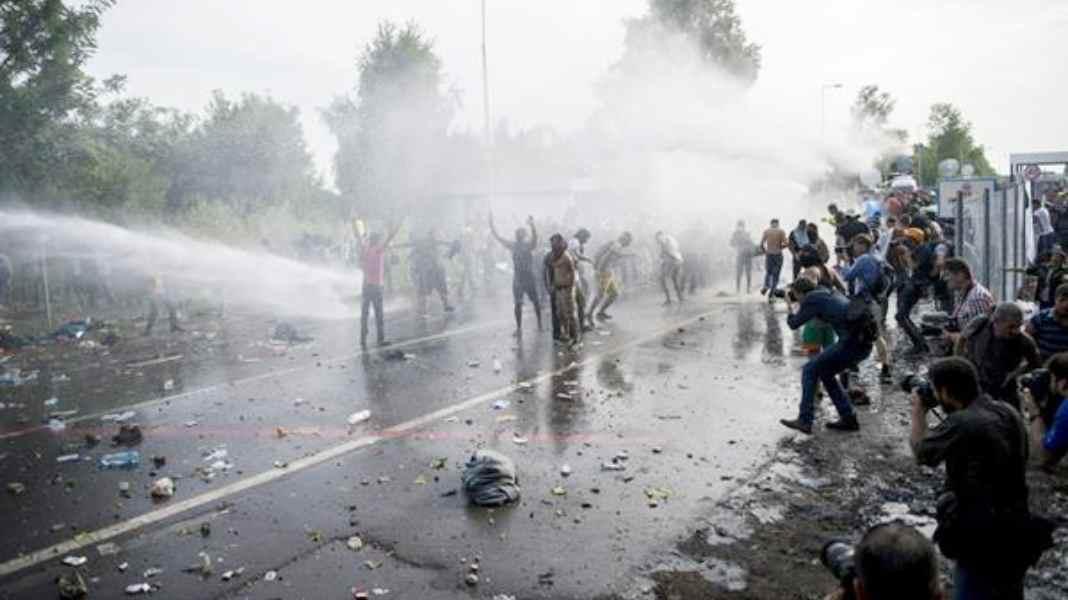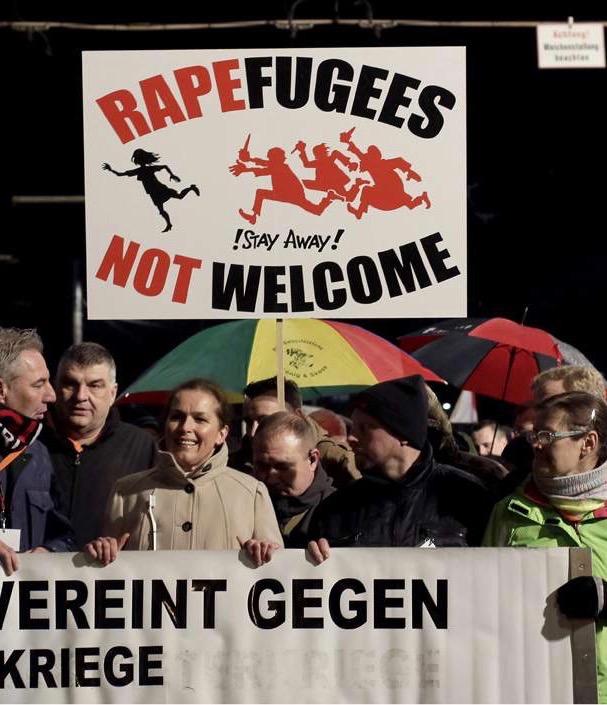Migration, Terrorism, and the Survival of the Liberal Project
archive


Migration, Terrorism, and the Survival of the Liberal Project
Liberal,1 equal-opportunity democracy is not the default reflex of most societies or of a majority of the peoples constituting them. Even rarer is empathic concern for persons, other than ethnic or religious kin, living beyond national frontiers.
Only in recent decades has Western Europe become an exception to those two truths. In its constitutions, courts and ministries it has institutionalized respect for human rights while displaying through foreign assistance programs a sustained measure of concern for the wretched victims of war, greed, ineptitude, autocracy, and natural disasters in the Global South. Civil society in the form of non-profit organizations has reinforced and extended the reach of official manifestations of cosmopolitan sympathy.
The liberal project is not the unique possession of people living in affluent democratic states. It finds supporters in every corner of the globe, though in many corners it is a distinctly minority faith. But with very few exceptions the West is the place where it has become embedded in law and powerful public institutions, and has deeply influenced popular discourse.
Proliferating instances of terrorism, growing inequality among social classes, rising tension between multi-generational citizens and culturally-distinctive groups of relatively recent settlement, and a looming intensification of migration pressures from Africa and the Middle East now threaten the liberal consensus in Western Europe, the site of its greatest strength. The threat is manifest in such phenomena as a multiplication of violent attacks by right-wing vigilantes on people of color, mosques, and migrant shelters (Germany), the entry of xenophobic parties into governing coalitions (Denmark), France’s prolonged state of emergency, and the negotiation of agreements with point-of-departure countries like Turkey intended to keep prospective asylum claimants from reaching European shores.
If anything in our volatile world can be predicted with confidence it is that pressure on Europe’s borders will continue to grow. In the Middle East and North Africa, a population which rose from 93 to 347 million between 1950 and 2000 is projected to reach by 2050 nearly 680 closely packed millions of people for whom employment prospects are dismal.2 War and repression are certain to join grim economic forces in driving migration.
The electorates of West European countries, like those in the United States, do not oppose all forms of additional migration. Welcoming the bearers of wealth or persons with special skills in short supply locally poses no difficult political problem and they arrive under criteria for admission which became narrowly drawn beginning in the 1970s when the great post-war surge of growth slowed drastically. The main focus of popular hostility has been migrant families from the Global South, above all people from Muslim-majority countries.

Syrian refugees near Greek border, September 2015. Photo source: AFP/Getty Images
The Muslim presence became an issue with bristling political resonance in different countries at different times, often propelled by a single catalytic event. In the UK it was the 1988 Rushdie Affair. In Denmark, already uneasy after the 9/11 2001 terror attacks in the US, it was the 2005 affair of the Mohammed cartoons and the role Danish imams played in arousing a furious response around the Muslim world which included mob attacks on identifiably Danish buildings and a boycott of Danish goods. In Germany it came much later, the end of 2015, when hundreds of young men apparently of largely North African origin harassed, groped, forcibly undressed and robbed young women during the traditional New Year’s Eve celebrations occurring in the center of Cologne and a number of other German cities. The French watershed was the 2005 Banlieue riots.
If anything in our volatile world can be predicted with confidence it is that pressure on Europe’s borders will continue to grow… War and repression are certain to join grim economic forces in driving migration.
Looming over the events specific to each country has been the threat of mass-casualty terrorism perpetrated in the name of Islam. That threat, together with the perception of elites and ordinary citizens, varying in time and intensity, that a not inconsequential (but hugely exaggerated) proportion of new arrivals and of second generation Muslims are deeply alienated, have conspired to reduce both the admission of asylum applicants and levels of economic support for them when they are able to pass through the door. In addition, the accumulation of highly publicized instances of cultural clash and terrorist attacks have led political leaders in countries that once supported the so-called multi-cultural approach to integration to declare it a failure which could imply some movement toward the French assimilationist ideal.
Collectively these developments have led to deep ambivalence and agonizing uncertainty among people of cosmopolitan sympathies including myself as a vicarious participant in Europe’s struggles. Liberal cosmopolitans face painful choices with respect to three related but analytically distinct questions. One is who should be admitted and on what terms? The second is the twinned dilemma: How to define integration and how to advance the integration of Muslims into secular societies with a Christian background? The third is what anti-terrorist measures to support? My searching for answers begins with the conviction that the first duty of persons concerned with human rights is the preservation of liberal regimes against authoritarian competitors and recognition that preservation may require recourse to a certain measure of illiberal means.

Hungarian police use water cannon against migrants near border with Serbia -- September 2015
What more than anything else makes the migration question peculiarly troubling are two core liberal principles. One is that the state should not use violence against persons who pose no threat to the security or health or exercise of rights by others. Yet violence of some degree is a condition of maintaining borders that are more than nominal.
The second background norm is that a gross unearned disparity in life chances is fundamentally unfair. Being born in Lagos rather than Louisville is a matter of chance that results in just such a disparity. In individual cases it can be corrected simply by allowing people from Lagos to settle in Louisville assuming they can pass individualized determinations that they do not pose threats to public order, public health, or national security. We do not know how many would exercise that choice if they had it; however, in a Gallup poll of Nigerian sentiment with respect to migration, 40 percent said they would migrate to the West if they could, a result which suggests orders of magnitude for Africa as a whole where the population is projected to increase by one and one-half billion people by 2050.3
Since advocacy of open borders spells suicide for politicians everywhere in the West, the real policy questions are: How many should be admitted annually? Should asylum claimants be able to jump the queue? Should family reunification trump skills? And should countries apply cultural as well as economic tests for admission?
Family reunification can be sold to Western electorates both on moral grounds and on the security-oriented ground that young men without wives or parents are the most volatile group in any society. It is likely that Western voters would also be receptive to immigration policies that screened prospective migrants for their willingness to accept—although not necessarily to endorse—contemporary European norms regarding sexual orientation, gender rights, and free speech.
the accumulation of highly publicized instances of cultural clash and terrorist attacks have led political leaders in countries that once supported the so-called multi-cultural approach to integration to declare it a failure...
A related but contentious question is whether governments should accommodate cultural practices that clash with those of the secular majority, such as hostility to exogenous marriage, polygamy, veiling, refusal to shake hands with members of the opposite sex, patriarchy in its various manifestations, separation of the sexes in school. Both conservatives and a number of liberal public intellectuals, feminists prominent among them, have—in the name of liberalism—called for intolerance of illiberal practices. For them liberalism is more than a recipe for social peace achieved though tolerance of different world views; it is a crusading faith.

Leipzig Germany - January 2016. Protestors response to the purported sexual assaults on German women by groups of young Muslim men at public New Year's Eve celebrations in Cologne and elsewhere.
Because illiberal practices are frequently associated with fundamentalist tendencies within the world of Sunni Islam, often referred to as Salafism or Wahabism, polemicists concerned primarily with national security rather than morality are divided over immigration policy as well. What divides them are differing convictions about the relationship between Salafist religious views and the leap to jihad. Some have argued that Salafism’s emphasis on a sharp separation between Muslims and non-Muslims, with the latter seen as intrinsically hostile and debased, makes young Western Muslims susceptible to jihadi recruitment. Others like Olivier Roy reject the grooming hypothesis and argue that manifestations of respect for the Muslim religion in all of its forms other than jihad will foster a more benign relationship between minority and majority to their mutual benefit.4
Also potentially dividing people who identify with the liberal creed are the complex of issues stemming from the use of security services and criminal law to mitigate the ongoing risk of mass-casualty terrorism. One thing that both sides of the security debate agree on is the prison system’s role in recruitment. Does it follow that convicted terrorists should be isolated either within national prisons or abroad? A second issue is whether to treat them as presumptively incorrigible and therefore subject to imprisonment for life, measures forbidden by the European Convention on Human Rights and most national constitutions? A third is whether persons who leave the country to join a terrorist organization like ISIS or Al Qaeda should be deemed to have committed treason or to have voluntarily relinquished their citizenship. And a fourth, to some degree encompassing the others, is whether certain measures of prevention—for instance detention or at least limits on mobility and extended periods of interrogation without the presence of counsel, both justified only on the basis of reasonable suspicion—should be normalized. Populists of the Right will undoubtedly support such measures, especially in light of attacks like those that struck Manchester, London, Paris, Nice, and Barcelona. Far less certain, however, is the future course of the liberal project in Western Europe, which as outlined above will be sorely tested as migration pressures intensify over the next thirty years.
1. For purposes of this brief essay, I define liberalism as a commitment to fostering equal opportunities for individuals to pursue their dreams as architects of themselves, but subject to the conditions that in shaping their own lives, they do not intrude on the equal life-shaping rights of others and they assume the civic duties necessary for the survival and continuing refinement of a system of government dedicated to the defense of the human rights first enumerated in the Universal Declaration.
2. Patrick Clawson, “Demography in the Middle East,” The Washington Institute for Near East Policy, 2016. www.washingtoninstitute.org/policy-analysis/view/demography-in-the-middl....
3. Eduardo Porter, “A Migration Juggernaut is Headed for Europe.” The New York Times, September 15, 2015. www.nytimes.com/2015/09/16/business/international/europe-must-plan-for-i....
4. Olivier Roy, Secularism Confronts Islam (NY: Columbia University Press 2007)
Paul Collier, Exodus: How Migration is Changing Our World (Oxford: Oxford University Press 2013)
Paul Kelly, ed. Multiculturalism Reconsidered (Cambridge: Polity Press 2002)
Giles Kepel, Terror in France (Princeton: Princeton University Press 2015)
Susan Moller Okin, ed, Is Multiculturalism Bad for Women? (Princeton: Princeton University Press 1999)
Bhikhu Parekh, Rethinking Multiculturalism (NY: Palgrave Macmillan 2006)
Christopher Heath Wellman and Phillip Cole, Debating the Ethics of Immigration: Is There a Right to Exclude? (Oxford: Oxford University Press 2011)



